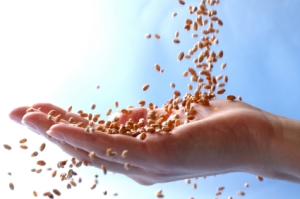
The path to our back yard composter.
The path towards indoor vermicomposting was a natural one for me. I love finding ways to expend the least amount of effort to accomplish the greatest number of tasks.
I used to loath the trip to the backyard composter throughout the winter. I’d stow my compostables in heaps and counter top buckets for several days just to avoid making the trip. It usually took more than one scurry to get it all out when I finally needed counter space or when the smell kicked me into action.
It was during one of these awful drudges, when the snow was up to my waist, that I decided to attempt vermicomposting.
Rough Start
Getting started wasn’t easy. The first hurdle was acquiring suitable worms. I initially opted for red wigglers over european nightcrawlers because I wanted them to multiply quickly and I was more partial to their slender appearance. There were no worm farms in the Ottawa area and none of the mail order worm companies could ship them in the cold. I had to wait until spring to get my seed stock of reds.
When I finally got started I was already getting into my yard work and my yearly search for organic materials (leaf litter, newspaper, manure etc) to add to my garden beds. After waiting so long to acquire my worms, I was naturally disappointed to learn that I’d have to wait yet another 3 months before harvesting vermicompost from my new bin. If I hadn’t been so determined to give it a try, I may have just given up. But I’m really glad I stuck to it.
Convenience was my main motivation for starting a vermicomposter. But many rewards have followed.
A Unique Pet
The first reward being the worms themselves. I was surprised to find myself checking them often to see what foods they liked and where they were hanging out. My husband would notice me checking them and he’d come check them too. I’m sure that sounds strange to some. But we hadn’t expected the worms to be so intriguing.
A few months after we got the worms I grew some sprouts in the bin to make it more esthetically pleasing. I was walking by my sprouts one day and I must have disturbed the worms because the sprouts started shifting about. It was hilarious! For a long time after that we continued to grow sprouts in the bin just so the kids could have fun tapping the sides and watching the sprouts move.
Gardener’s Delight
Now that I have several pounds of worms composting throughout the year, I have plenty of worm castings to spare each spring. This alone has saved me more money than the initial costs of getting started. I don’t buy artifical fertilizers and my plants are much healthier than my past crops. Due to the high content of available nutrients in worm castings, my plants are also able to fend off pests and tolerate diseases without assistance. I’ve never had so many tomatoes per plant as I do now. I’ve been using sheep manure for years. But nothing tops vermicompost.
Friends Forever
The worms have paid us back in many ways. I will always have at least one worm bin in my home. It was definately worth the wait.
Read Full Post »
 Seedy Saturday is a National program that’s organized every spring by Seeds of Diversity. The goal is to encourage the exchange of heritage seeds and to share information relating to organic agriculture. To find dates and event details for your area, click here.
Seedy Saturday is a National program that’s organized every spring by Seeds of Diversity. The goal is to encourage the exchange of heritage seeds and to share information relating to organic agriculture. To find dates and event details for your area, click here.